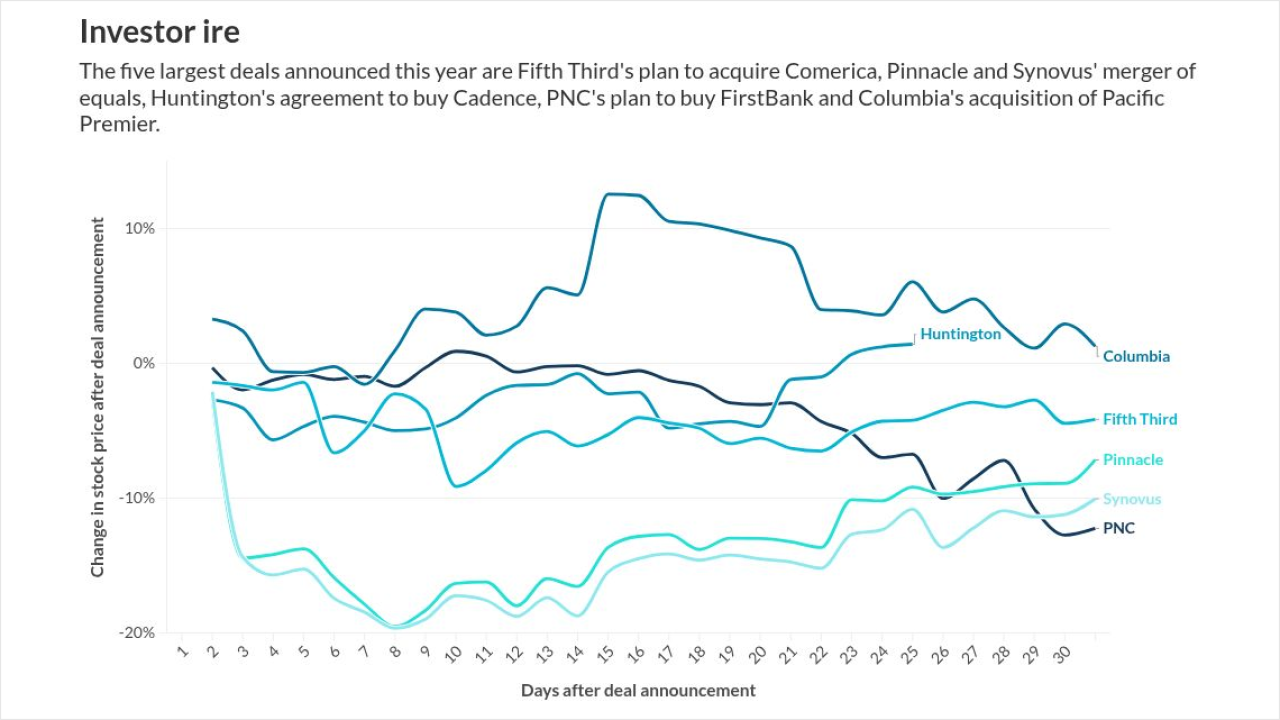In the three years since her former boss left to become New York State's top insurance regulator, Elizabeth McCaul has filled in as the state's banking superintendent and waited for the word "acting" to be taken out of her title.
She has overseen the state's 3,500 financial institutions, listened to the seemingly endless complaints of financial executives and consumer groups, and occasionally placated political bosses in Albany and Washington. In addition she has promoted, with the zeal of a recent convert, the virtues of the state banking charter.
When Neil D. Levin, who had been a colleague of Ms. McCaul's at Goldman Sachs in their pre-regulatory days, left the State Banking Department in 1997, rumor had it that she would soon follow and continue as his lieutenant - at the Insurance Department. There was even talk that the two agencies would merge, with Mr. Levin taking over as some sort of super-regulator.
But the idea of regulatory convergence soon died, and Ms. McCaul remained acting superintendent of banking month after month.
In that role she surprised everyone with her leadership ability, and in December she finally received Gov. George Pataki's nomination to hold the job for real. The state Senate is expected to approve her appointment this session.
Bankers in New York seem pleased with the decision. "The Pataki administration has been in office for nearly six years," says Michael P. Smith, president of the New York Bankers Association. "Elizabeth has been in that department for that entire period of time. We have extended experience with her, which has led to openness and dialogue. The department is always amenable to hearing our views. She's very energetic, she enjoys her job, and she's not afraid to speak her piece. That's good for the industry."
Even more impressive is that while bankers have been relatively happy with Ms. McCaul's performance, so have their sometime foes: the state's community groups.
Sarah Ludwig, executive director of the Neighborhood Economic Development Advocacy Project, says, "To her credit, Elizabeth McCaul has been remarkably approachable. She listens a lot and takes lots of notes. She's very respectful. She doesn't fit the profile of a regulator who won't meet with community groups."
Matthew Lee, executive director of the Inner City Public Interest Law Center, goes even further. "I've been surprised by some of the things she's done on a consumer basis, because she's a Republican appointee," he said. "She's actually reached out to groups, invited them to lunch, gotten their views. You don't see that at other agencies. She's aware of Community Redevelopment Act issues and she raises them. The Banking Department, on its own initiative, has gotten CRA commitments from banks. She's more attentive to CRA than one would expect. It's a different kind of Republicanism."
Ms. McCaul, 38, is in the midst of a juggling act: balancing the needs of New York's financial services consumers while extending the life of the state banking charter, at a time when many feel financial reform and multi-state branching have rendered the dual banking system obsolete.
She says she is the state charter's "biggest fan," though she too was skeptical about its relevance when she first joined the Banking Department as Mr. Levin's chief of staff in 1995. "We have an incredibly unique banking system in this country, that has created a very prosperous economy," she said recently, in an interview in her spacious office near Trinity Church in downtown Manhattan. "The dual banking system provides a check and balance, creates competition, and spurs innovation."
To keep the charter attractive and the New York Banking Department in business, Ms. McCaul works hard to promote legislation, such as the so-called wild-card statute, which gives state banks the right to pursue the same activities as national banks.
In addition to an open-door policy for banks and consumer groups, Ms. McCaul has also built relationships abroad. This is important because her agency oversees 191 foreign-based institutions with offices in the U.S. and 14 New York banks with multinational operations. (The department also regulates another 3,295 banks, savings and loans, credit unions, trust companies, mortgage brokers, and consumer and general finance companies.)
The Banking Department's six-person beachhead in Tokyo, which opened last year, and its five-man London office have already yielded important results. In the fall, when HSBC's application to merge with Republic New York Corp. was pending, a Japanese regulator brought a puzzling document to a New York State banking official in Tokyo, hoping for an explanation. That piece of paper eventually led to a fraud investigation at Republic's securities unit in Princeton, N.J. The ensuing scandal forced Republic's majority owner Edmond Safra to sell the bank at a lower price to HSBC and nearly scuttled the $10 billion deal altogether.
"With all the globalization that's gone on in the marketplace, nothing replaces a real relationship where you can pick up the phone and talk to another regulator," Ms. McCaul says. "Knowing people on a first-name basis is tremendously helpful."
The Banking Department's efforts to keep the state charter viable seem to have paid off. When Chemical Banking Corp. bought Chase Manhattan Corp. and took its name in 1996, the combined entity opted to go with a state charter. When HSBC's deal to buy Republic finally closed at the end of last year, the London-based acquirer also decided to stay with the state as regulator for its greatly enlarged U.S. subsidiary.
The men who run institutions that have operated under state charters for many years explain why. Thomas A. Renyi, chairman and CEO of Bank of New York Co., says, "the New York State charter remains attractive because New York and the state Banking Department have a track record of enacting and administering banking laws in a way that affords New York banks the flexibility to pursue new strategies."
Thomas S. Johnson, who runs New York City-based GreenPoint Financial Corp., one of the nation's largest thrifts, says his institution has been examining the pros and cons of the two types of charters since the company went public in January 1994. "If you need licensing of various types, and you have a national charter, you can get by without having to get licenses from different states," he said. "But up to this point, the advantages of the national charter have never outweighed those of the state charter.
"We are particularly pleased with our regulator in the state," he continued. "They've been very fair and responsive to our needs. Their examinations are always very quick and to the point. We have a good relationship with them. They are willing to treat us in a mature fashion."
Spurred by financial modernization, Roslyn Savings Bank of Roslyn, N.Y., with $7.5 billion of assets, considered switching to a national charter six months ago. "There are some minor advantages to a federal charter, like not having to pay interest on escrow accounts," says chairman and CEO Joseph Mancino. But "we can phone the Banking Department, and Elizabeth always takes our calls. I don't know if that would happen with the OTS. At this point, there's nothing this bank would want to do that it can't do with a state charter. The accessibility of our regulators is very important to me."
Along with the plaudits, however, comes a fair amount of criticism, particularly concerning the department's current efforts to make the state's fair-lending regulations tougher than the federal Home Owners Equity Protection Act. The proposed regulations, expected to be adopted by the state banking board in May, would, among other things, set the amount of percentage "points" on a loan that can be financed at five; limit, with some exceptions, monthly payments to 50% of a borrower's gross monthly income; and define a high-cost loan as one with an interest rate of 8% above Treasuries (the federal law is 10%).
In addition, the rules would limit how often loans can be refinanced or "flipped," and how many unneeded or unwanted credit and insurance products can be forced on a borrower - a practice called "packing."
Predictably, the 140-member New York Bankers Association claims the proposed regulations would dry up credit and "create unnecessary additional regulatory burdens."
Meanwhile, 82 signatories - mostly community organizations and like-minded politicians - have endorsed a letter that says the Banking Department does not go far enough.
Ms. Ludwig of the Neighborhood Economic Development Advocacy Project, which took a leadership role in putting together community comment on the proposed rule, says, "The regulations have loopholes all over them that will allow circumvention by predatory lenders. The Banking Department has got to get this right. This is an opportunity to do something really meaningful. The whole country is looking to New York. States around the country are going to replicate it. If they want to be effective regulators, they have to do better."
Ms. McCaul, who perhaps has acquired her patience from overseeing a brood of five children ranging in ages from 16 months to 16 years - including two teenagers from the previous marriage of her husband, Goldman Sachs municipal financier Frank Ingrassia - maintains that the proposed regulations would curtail abusive lending in the state.
"I think it will be wonderful to see this enacted as a model across the country," she says.
But the attacks don't stop there. Ms. McCaul also had to fight Democratic attorney general Elliot Spitzer last year to determine whose agency would get the credit for reigning in rogue subprime lender Delta Funding Corp.
The Banking Department eventually won a $12 million settlement from Delta, but some community activists continue to grumble that Ms. McCaul should have revoked Delta's license and put it out of business.
Ms. Ludwig says, "The settlement with the Banking Department was scandalous. They let Delta off the hook. Predatory lenders target the very communities that banks don't serve. Huge swaths of the city and state have a lending gap. The Banking Department does not push banks enough to lend in these neighborhoods, and that creates an environment where these predatory lenders can flourish."
Ms. McCaul responds that her department could easily have made the case for revocation but chose not to, because a bankrupt Delta would have meant no refunds for any ripped-off customers. "The rebates will be from $50 to $400 per person per month, depending on how much was borrowed," she said. "Our examiners are now babysitting that company to ensure that their practices do not revert to their previous ways."
The Banking Department has hired 100 specialists with industry and market experience to, among other things, keep an eye on the loan files of subprime lenders. Ms. McCaul is also negotiating with the Securities and Exchange Commission to work out some kind of joint oversight of investment and commercial banks that securitize subprime credits.
"Securitization has opened up a spigot to provide money for subprime lenders. I want to make it standard practice that investment bankers have to do due diligence on the subprime loans they are securitizing," she says.
Because Ms. McCaul has a tendency to speak softly and listen intently, people indicate that she is liked more than she is taken seriously. "She's so nice," says one community activist; "a terrific person," says former Comptroller of the Currency Eugene Ludwig.
But in her quiet way, Ms. McCaul has wrought a fair amount of change in the way banks are regulated in New York State, and soon those in positions of financial and political power may be listening intently to her.





